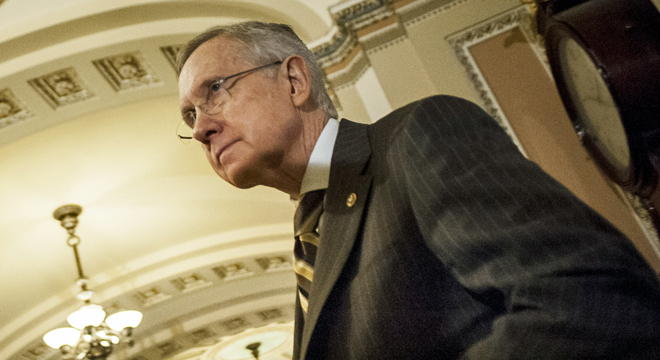Senate Democrats will enter the new year with an expanded majority of 55-45, having gained two seats in the election. They may be emboldened, but Republicans will retain the ability to slow down or halt their agenda with the use of the filibuster, which requires 41 senators.
If Senate Minority Leader Mitch McConnell continues to wield the filibuster as routinely as he did in President Obama’s first term, Majority Leader Harry Reid will need to pick off at least five Republican senators to advance initiatives.
Here are his five most likely targets.
Susan Collins
The most moderate Republican in the Senate — or as Democrats argue, the only one left — Collins will be Reid’s first target when he needs GOP votes.
During Obama’s first term, the Maine Republican broke with her party more often than any of her remaining colleagues, and now that her state — and the country — has resoundingly re-elected the president, she has plenty of reasons to continue.
Also noteworthy: Collins is up for re-election in 2014, and Democrats will be eagerly watching for any of her votes or positions they can use to paint her as out of touch with her liberal state.
Lisa Murkowski
The Alaska Republican has been less loyal to party’s leaders since she lost her GOP primary race in 2010 but won re-election as a write-in candidate.
Murkowski later broke with the GOP on a series of defining votes, such as the DREAM Act, repealing “don’t ask, don’t tell” and the Paul Ryan budget. This year, she spoke out on her party’s need to stop alienating women voters and made a public showing of support for Democrats against House and Senate Republican leaders on the Violence Against Women Act.
Dean Heller
Heller, who was appointed to replace Sen. John Ensign (R-NV) last year, held his seat in a close contest. Given his slim margin of victory and the fact that his constituents voted by a significant margin to send Obama back to the White House, Heller will have an incentive not to be seen as an ongoing thorn in the president’s side as he works to build a reputation in the chamber.
Heller has displayed an interest in breaking with his party — a major example was his vote against the Ryan budget last summer — and his home state colleague Reid will be eying further opportunities to win his vote.
Mark Kirk
Even as he projects an image as a relative moderate, Kirk’s votes have been difficult to predict as he has also worked to gain the trust of the conservative movement. The Illinois Republican’s votes for the Ryan budget and for repealing “don’t ask, don’t tell” reflect that dynamic.
But as a Republican from a solidly liberal state, and the first person elected to fill Barack Obama’s old seat, Kirk has motivation not to be seen as a partisan ideologue. He cultivated a relatively moderate voting record as congressmen, and has occasionally been willing to break with his party as senator, making him a winnable vote for Reid.
Kirk, who has been recovering from a stroke, expects to return to the Senate in January.
Lindsey Graham
Graham is a tricky target because he is up for re-election in bright red South Carolina in 2014. But the senator has, in recent years, collaborated with Democrats on major issues like immigration and climate change, and in the wake of Obama’s re-election, is urging his party to soften its opposition on immigration reform in order to win back Hispanics. He has also been vocal about his support for raising tax revenues to reduce the debt.
If Graham gets hounded by a credible primary challenger early next cycle, his desire for cooperation could prove short-lived. But if he fends off an intra-party battle for his seat, the South Carolinian could reignite his bipartisan streak and become a central figure in advancing and molding Obama’s key second term initiatives.






